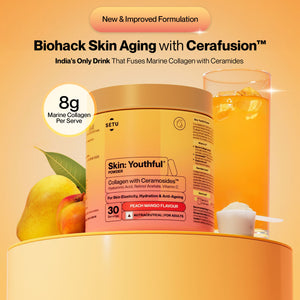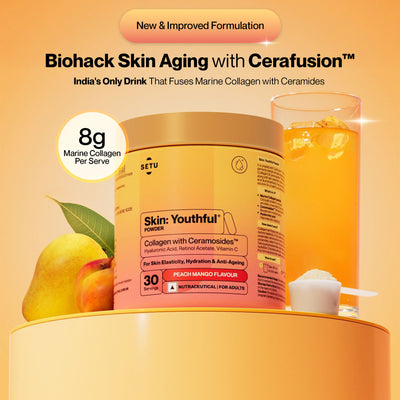Collagen For Your Skin: Healthy or Hype?
24 Jul 2024
Introduction
In the quest for youthful, radiant skin, everyone seems to be turning to collagen supplements. Collagen supplements, whether marine collagen peptides, bovine collagen, or even plant-based collagen builders, have taken the beauty and wellness world by storm, celebrated as the ultimate solution for maintaining and enhancing skin health.
But with their skyrocketing popularity, we ask: is collagen truly the miracle it’s claimed to be, or is it just another overhyped trend? Are we investing in genuine skin health or buying into the hype? In this article, we'll delve into the science behind collagen, its necessity, and the benefits it offers for your skin. By the end, you'll have a clear understanding of whether collagen for your skin is genuinely healthy or just the latest beauty fad.
What is Collagen?
Collagen is the most abundant protein in the human body, constituting about one-third of its total protein content. It is a crucial component of connective tissues found in skin, bones, muscles, tendons, and ligaments. Collagen acts as the structural scaffold that provides strength and elasticity to these tissues, ensuring they function properly and maintain their integrity.
There are at least 16 types of collagen, but the majority in the human body consists of types I, II, and III. Type I collagen is the most prevalent, found in the skin, bones, and other tissues, providing tensile strength and structure. Type II is primarily found in cartilage, aiding in joint health, while Type III supports the structure of muscles, organs, and arteries.
Is Collagen Necessary?
Collagen is undeniably essential for maintaining the structural integrity of our skin and other tissues. However, as we age, the body’s natural collagen production declines. Starting in our mid-20s, we lose about 1% of collagen per year, leading to signs of aging such as wrinkles, sagging skin, and decreased elasticity. Environmental factors like UV exposure, smoking, and poor nutrition can further accelerate collagen depletion.
Given its critical role and the natural decline with age, it becomes important to find ways to support collagen synthesis and maintain skin health. This is where collagen supplements and other supportive measures, like collagen-rich foods, prebiotics and probiotic benefits, come into play.
Collagen For Skin: Healthy or Hype?
The Benefits of Collagen for Skin
Collagen supplements have been widely promoted for their potential benefits to skin health. The most significant benefits include:
- Improved Skin Elasticity and Firmness: Collagen helps maintain the skin's elasticity, reducing the appearance of fine lines and wrinkles. Studies have shown that collagen supplements can improve skin hydration and elasticity, resulting in a more youthful appearance.
- Enhanced Hydration: Collagen helps in retaining moisture in the skin, preventing dryness and flakiness. This hydrating effect can lead to a smoother and more supple complexion.
- Reduction in Wrinkles: By increasing collagen levels in the skin, supplements may help reduce the depth of wrinkles and fine lines, promoting a more youthful look.
- Support for Skin Repair and Renewal: Collagen aids in the repair and regeneration of skin cells, promoting a healthier and more radiant complexion.
Is it Healthy or Hype?
While some skepticism exists regarding the necessity of collagen, scientific evidence supports its powerful benefits for skin health. Collagen is a fundamental protein that plays a vital role in maintaining the structure, firmness, and elasticity of the skin. As we age, our body's natural collagen production declines, leading to visible signs of aging such as wrinkles, fine lines, and sagging skin. Collagen supplements can help counteract these effects by replenishing the body's collagen levels.
Clinical studies have demonstrated that oral collagen supplements can significantly improve skin elasticity, making the skin appear more youthful and resilient. Enhanced elasticity means the skin can better withstand the daily wear and tear, reducing the formation of wrinkles and fine lines. Additionally, collagen supplements have been shown to increase skin hydration. Well-hydrated skin is not only more radiant and smooth, but also more capable of retaining its firmness and preventing dryness and flakiness.
Moreover, collagen supplements can enhance dermal collagen density, which is the amount of collagen present in the skin's deeper layers. Higher collagen density contributes to the skin's structural integrity, helping to maintain its firmness and reduce sagging. This is particularly beneficial for aging skin, which tends to lose its natural support and plumpness over time.
Collagen-Rich Food Sources
In addition to supplements, certain foods can boost collagen production in the body. These include:
- Bone Broth: Rich in collagen, bone broth made from simmering animal bones is a great source of natural collagen.
- Fish and Shellfish: Marine collagen, found in fish and shellfish, is highly bioavailable and supports skin health.
- Egg Whites: Egg whites contain high levels of proline, an amino acid essential for collagen synthesis.
- Citrus Fruits: High in vitamin C, citrus fruits like oranges, lemons, and grapefruits promote collagen production.
- Berries: Berries like strawberries, blueberries, and raspberries are rich in antioxidants and vitamin C, aiding collagen synthesis.
- Garlic: Garlic contains sulfur, which is necessary for collagen production, and helps maintain the structure of collagen fibers.
Prebiotics & Probiotic Benefits For Collagen Synthesis
The Role of Prebiotics and Probiotic Benefits
Prebiotics and probiotics play a significant role in maintaining gut health, which in turn affects overall health, including skin health. A healthy gut microbiome can enhance nutrient absorption, including those necessary for collagen synthesis.
-
Prebiotics
These are non-digestible fibers that feed beneficial gut bacteria. Foods rich in prebiotics include garlic, onions, leeks, asparagus, and bananas. Prebiotics maintain a healthy gut environment, which supports overall health and can indirectly promote collagen production.
-
Probiotics
These are live beneficial bacteria that improve gut health. Probiotic benefits include enhanced digestion, improved immune function, and better nutrient absorption. Fermented foods like yogurt, kefir, sauerkraut, and kimchi are excellent sources of probiotics. A balanced gut microbiome supported by probiotic benefits ensures that the body effectively utilizes nutrients essential for collagen synthesis.
Collagen Supplements
Collagen supplements come in various forms, including powders, capsules, and liquids. However, it is essential to note that not all collagen supplements are created equal. The bioavailability and absorption of collagen peptides can vary significantly among different products.
High-quality collagen supplements are formulated to maximize absorption, ensuring that the collagen peptides reach the targeted areas and deliver the desired results. When choosing a collagen supplement, consider the following:
- Hydrolyzed Collagen: This form, also known as collagen peptides, is broken down into smaller peptides, making it easier for the body to absorb and utilize.
- Marine Collagen: Sourced from fish, marine collagen is known for its high bioavailability and effectiveness in promoting skin health.
- Multi-Collagen Blends: Some supplements combine different types of collagen (I, II, III) to provide comprehensive benefits for skin, joints, and overall health.
- Quality and Purity: Opt for supplements that are free from additives, fillers, and artificial ingredients. Look for third-party tested products to ensure quality and potency.
You can find these benefits in Setu’s Skin: Youthful - Marine Collagen powder, which also comes in a delicious peach mango flavour. It contains skin-boosting ingredients, like Hyaluronic Acid, Vitamin C, Zinc, and Biotin as well. By including Setu’s powder in your daily routine, you can discover comprehensive support for skin, joints, and overall wellbeing. Combining the benefits of collagen-rich fruits with marine collagen supplements can create a synergistic effect, providing a holistic approach to nourishing your body from the inside out. Taking collagen supplements can be a convenient way to boost your body’s collagen levels, but it’s essential to combine them with a healthy diet and lifestyle for the best results.
Conclusion
Collagen is undeniably a critical component for maintaining healthy, youthful skin. Its natural decline with age necessitates finding ways to support collagen synthesis and maintain skin health. Collagen supplements, combined with a diet rich in collagen-boosting foods and supported by prebiotic and probiotic benefits, can effectively enhance skin elasticity, hydration, and overall appearance. While the hype around collagen is substantial, the science supports its benefits, making it a healthy choice for those seeking to improve their skin health. By understanding the role of collagen and incorporating supportive measures, you can enjoy the youthful, radiant skin you desire.
Skin: Youthful with Marine Collagen & Ceramosides™
- ₹1,694
- ₹1,694
-
₹2,200 - ( 23% OFF)
Categories
- Choosing a selection results in a full page refresh.
- Press the space key then arrow keys to make a selection.
this is the sidecart














